 The logarithm of a fraction is equal to the logarithm of the numerator minus the logarithm of the denominator: log a/b = log a — log b. The logarithm of a fraction is equal to the logarithm of the numerator minus the logarithm of the denominator: log a/b = log a — log b.  Surveyor 1 & C. - Page 92by United States. Bureau of Naval Personnel - 1951 - 288 pagesFull view Surveyor 1 & C. - Page 92by United States. Bureau of Naval Personnel - 1951 - 288 pagesFull view - About this book
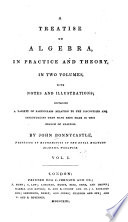 | John Bonnycastle - Algebra - 1813 - 456 pages
...Hence the logarithm of a fraction, or of the quotient arising from dividing one number by another, is equal to the logarithm of the numerator minus the logarithm of the denominator. And if each member of the equation ar = y be raised to the fractional power -, we shall have щ т wt a"... | |
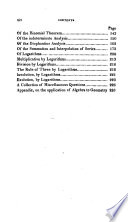 | John Bonnycastle - Algebra - 1818 - 284 pages
...Hence the logarithm of a fraction, or of the quotient arising from dividing one number by another, is equal to the logarithm of the numerator minus, the logarithm of the denominator. And if each member of the common equation a x =y be raised to the fractional power denoted by — , we... | |
 | James Ryan - Algebra - 1824 - 550 pages
...Hence the logarithm of a fraction, or of the quotient arising from dividing one number by another, is equal to the logarithm of the numerator minus the logarithm of the denominator. 508. And if each member of the equation, a*=y, • m be raised to the fractional power "i, we shall... | |
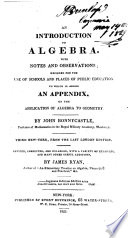 | John Bonnycastle - Algebra - 1825 - 336 pages
...Hence the logarithm of a fraction, or of the quotient arising from dividing one number by another, is equal to the logarithm of the numerator 'minus the logarithm of the denominator. And if each member of the common equation a*=y be raised to the fractional power denoted by—, we shall... | |
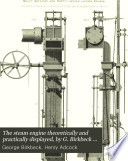 | George Birkbeck - 1827 - 166 pages
...Substituting these conditions in the above general formula, and bearing in mind that the logarithm of a fraction is equal to the logarithm of the numerator, minus the logarithm of the denominator, we shall have the three following equations of conditions : - 0 4259687 = 25 o + 635 b + 15625 c -... | |
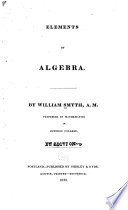 | William Smyth - Algebra - 1830 - 278 pages
...therefore by adding the logarithm of 5 to that of 7. Since moreover the logarithm of a fraction will be equal to the logarithm of the numerator minus the logarithm of the denominator, it will be sufficient to place in the tables the logarithms of entire numbers. 216. -If in the equation... | |
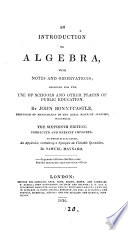 | John Bonnycastle - 1836 - 296 pages
...Hence the logarithm of a fraction, or of the quotient arising from dividing one number by another, is equal to the logarithm of the numerator minus the logarithm of the denominator, or to the logarithm of the dividend minus that of the divisor. TIT raised to the fractional power denoted... | |
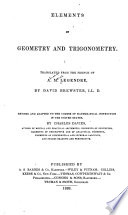 | Adrien Marie Legendre - Geometry - 1838 - 382 pages
...56 ; hence it would have been more exact to have added the former number. The logarithm of a vulgar fraction is equal to the logarithm of the numerator, minus the logarithm of the denomPLANE TRIGONOMETRY. 283 inator. The logarithm of a decimal fraction is found, by considering it... | |
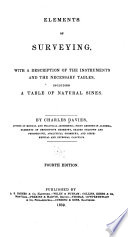 | Charles Davies - Surveying - 1839 - 376 pages
...equal to the quotient obtained by dividing the numerator by the denominator, its logarithm will be equal to the logarithm of the numerator minus the logarithm of the denominator. Therefore, log VW=log 3678 — log 100 = 3.565612 — 2 = 1.565612 from which we see, that a mixed... | |
 | Charles Davies - Surveying - 1839 - 376 pages
...equal to the quotient obtained by dividing the numerator by the denominator, its logarithm will be equal to the logarithm of the numerator minus the logarithm of the denominator. Therefore, log VoV=l°g 3678 — log 100 = 3.565612 — 2 = 1.565612 from which we see, that a mixed... | |
| |